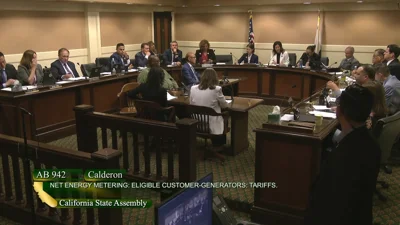
Is California’s Solar Revolution at Risk? The Fierce Debate Over Rooftop Incentives
In a state renowned for its green ambitions, California's push toward sustainable energy is facing a major shakeup. At the heart of the controversy is Assembly Bill 942, a proposal that could slash incentives for rooftop solar users, potentially affecting millions of households. As electricity rates soar and climate goals hang in the balance, this bill highlights the growing tension between environmental progress and economic equity, raising questions about who truly benefits from the solar surge.
The debate reignited this week when the California State Assembly's Utilities & Energy Committee voted 10-4 to advance an amended version of AB 942. Originally introduced by Assemblymember Lisa Calderon, a former Southern California Edison executive, the bill targets net energy metering programs that have long rewarded homeowners for feeding excess solar power back into the grid. Calderon argues that these incentives unfairly burden non-solar customers, inflating their bills by $200-$400 annually, as cited by the California Public Utilities Commission. "This is about fairness and equity," Calderon stated, pointing to potential savings of $3.6 billion for ratepayers through 2043 by curbing subsidies.
However, solar advocates fiercely oppose the changes. Brad Heavner, executive director of the California Solar and Storage Association, condemned the bill as a "breach of contractual promises" made to millions of users who invested in solar based on 20-year guarantees. He warned that reducing compensation upon home sales could devalue properties and disproportionately harm middle- and working-class families, many of whom earn under $100,000 annually, according to Lawrence Berkeley National Laboratory data. Protests erupted outside committee hearings, with homeowners like Dwight James from Simi Valley sharing personal stories: "We didn't expect the state to break its promise to us." Environmental groups, including 125 organizations, echoed these concerns, arguing that solar reduces grid strain and saves consumers $1.5 billion yearly, countering utility claims of a "cost shift."
This isn't just a policy skirmish; it's a broader clash over California's energy future. Utilities like Pacific Gas & Electric back the bill, framing it as a way to lower rates for all, while critics accuse them of prioritizing profits from infrastructure spending over renewable innovation. Meanwhile, a related bill, AB 1260, promotes community solar as an alternative, but it too faces resistance for potentially undermining rooftop mandates. The amendments to AB 942, which now limit cuts to home sales, have done little to quell the outrage, as opponents fear it sets a dangerous precedent for clean energy commitments.
As these bills move to the Appropriations Committee, the implications are profound. Supporters see it as essential for affordability, while detractors view it as a setback for climate goals. This ongoing battle underscores the challenges of balancing immediate costs with long-term sustainability in a state battling rising energy demands and environmental crises.
In the end, California's solar wars reflect a pivotal moment: Will prioritizing equity accelerate or hinder the transition to renewables? As debates intensify, one thing is clear—this fight could reshape how everyday Californians access clean energy. What do you think—should solar incentives be preserved, or is reform necessary? Share your views in the comments and help us explore the path forward.